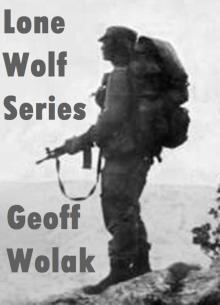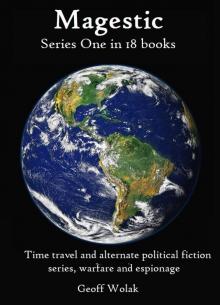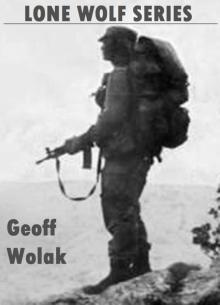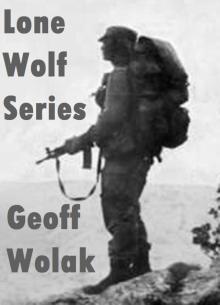- Home
- Geoff Wolak
Almost Eden Page 3
Almost Eden Read online
Page 3
So why had she favoured me, I considered as I drove. I had visited once a year or so, more to do with the fact that I liked to holiday in Devon and Cornwall than my fondness for the old lady; if she had lived in Scotland I would have never seen her. Had she developed an attachment to me during my visits? Was I, by default, the favourite because the others had never bothered to visit her? Was I inheriting this house because – in simple terms – I was the only suitable candidate, or had she developed an attachment to me when I was young?
Thinking back, I soon realised that I had holidayed with her a great deal back then, maybe four times a year, and that I had travelled down to stay with her without my parents, when I was sixteen and seventeen. Hell, it was a cheap holiday on the coast at a time when I could never have afforded a hotel or bed and breakfast, and at a time when I craved independence from my parents. Had the attachment been formed back then, when I kindly helped clear her garden or tend her roses, when I had sat in with a lonely old woman on rainy days?
As the signs for various holiday towns appeared, the clouds parted and allowed the warm sun through, and I again reached for my sunglasses. Sensing something familiar on the radio, I turned the volume up, soon finding myself driving in bright sunshine and being accompanied by Hot Chocolate’s “You sexy thing” sounding out.
‘…where you from, you sexy thing,’ I sang along with. Hell, I had bought the original record, a vinyl 45.
With a smile on my face, and with the particular radio show now playing nostalgic hits from the 1970s and 1980s, I was offered a clear sky ahead. The M5 motorway soon came to an abrupt end, and beyond Exeter I joined a familiar A38 towards Plymouth. In places I managed to make fifty miles per hour, but this road was no motorway, and it took another forty minutes to reach the exit for Salcombe.
I turned off before Ivybridge, and I was soon heading due south along narrow country roads, and passing lumbering muddied tractors. Country pubs appeared around bends, ornate and dated thatch cottages flittered past, fields glimpsed through breaks in high hedges.
Pulling up in Kingsbridge, I checked the directions for the firm of solicitors, soon realising that they were in fact located here in Kingsbridge, not in New Bridge. I also sat wondering why my map had many ‘bridges’ in local place names, yet some were part of the name, some a separate word. I guessed that in those days they named places with a practical slant, and New Bridge was indeed where a new bridge had been built across a river that led into the Kingsbridge Estuary, which led on down to Salcombe, and finally to the sea.
Easing into a pub car park, I made sure I had the letter with me and I crossed the road, finding a side door next to a busy butchers shop. The door was unlocked and ajar, and I climbed steep and narrow stairs, finding a middle-aged lady at the top. She took out ear pieces, having been typing from a dictated letter, and offered a formal smile.
‘I’m looking for a Mister Pugh.’
‘Old Mister Pugh, or Mark Pugh?’
‘I’ve … no idea.’ I produced the letter and handed it over.
‘Ah, that’s Mark Pugh.’ She stood, untangling herself from her ear piece. ‘Who shall I say is calling?’
I felt like saying “It’s on the damn letter head in your hand”, but resisted. ‘Roger Bannister, like the runner.’
‘The who?’ she puzzled.
‘Never mind,’ I added, hoping I did not sound irritated.
She stepped into a side room without knocking the door. A minute later she reappeared. ‘Would you like to come in?’
I stepped past her as she held the door.
‘Tea?’ she asked after me.
‘Please,’ I urged. ‘I’ve just driven down from London.’
A man in his thirties eased up from behind a desk covered in files, and he extended a hand by reaching across his messy desk, his tie held firm with the other hand. I reached across and shook. ‘You’re Roger Bannister, yes?’
‘Yes, Mrs Hobson was my aunt, not that I visited often.’ We both sat. ‘So you see … this is all a bit of a surprise.’
‘Well, I can’t say I knew the particular lady, but my father prepared the will.’ He opened a file. ‘Do you have some … identification?’
‘Sorry, yes, of course.’ I pulled out my wallet, handing over my driver’s license, a credit card, and from a coat pocket I pulled out three utility bills, a letter from the government detailing my national insurance number, and finally my dated birth certificate.
‘I’m sure it’s all in order,’ he offered me with a forced smile. ‘But we have to show due diligence.’
‘Of course,’ I agreed.
With my cup of tea placed down, the solicitor photocopied my documents, finally placing the copies in a file. I signed two forms, took receipt of a copy of the will and the house deeds, but then immediately handed back the house deeds – asking that he retain them whilst taking me on as a new client. He keenly did as asked, a New Client Letter of Appointment signed by me. For some reason, I did not want my firm in London to handle this, and as I sat there I guessed it was for the same reason that I had kept my divorce away from them.
He finally took out a bundle. ‘OK, just to brief you on what was included in the will, since the will describes the estate – but not what it entailed. OK -’ He glanced at the detail. ‘Ah yes, my father did go through this a few weeks ago. Right, there’s the main house -’ He looked up. ‘- I presume you’ve visited it?’
‘Often, yes, especially in my youth. Last time was … oh, four years ago.’
‘Needs a bit of work, I’m afraid.’
‘And to sell it, what value would you place on it?’
He eased back, and made a face. ‘If it was on the Salcombe side of the estuary, and with good access … maybe … four hundred thousand at least.’
‘Four … hundred thousand,’ I found myself repeating.
A nod confirmed the number. ‘But it’s across the estuary, as you know, and a thirty minute drive from … well, anywhere. Roads are poor down to it.’
‘Someone might like the idea of … isolation.’
Again he nodded, making a face. ‘Yes, that may appeal to some. But where it sits, and in the condition that it’s in, I’d value it at closer to two hundred and fifty thousand pounds.’
My ex-wife, Wendy, had guessed correctly.
‘OK, reading on … there’s then the cottage -’
‘Cottage?’ I repeated.
‘At the top of the woods.’
‘I know it, but I never knew it was hers.’
‘Has a sitting tenant, but he doesn’t pay rent.’
‘No … rent?’
‘No, he was retained to maintain the old house and grounds, the beach, an … odd job man of sorts. He’ll … need to be given notice.’
‘Oh. Well, I suppose I should go chat to him.’
‘Be … careful. He … has a reputation.’
‘Reputation?’
‘Something of a … country lad, works on local farms, big and strong like an ox, but … a bit simple.’
‘Simple?’
‘Not much of an education.’
‘Oh. And … what would you value the cottage at?’
‘With the land adjacent to it, maybe one hundred thousand pounds. It’s a small cottage, low ceilings, needs a great deal of work.’
‘What land … are you referring to?’ I puzzled.
‘The woods, and the stream leading down to the estuary.’
‘That belonged to Aunt Hobson?’
‘Yes, along with two large ploughed fields above it, leased to a local farmer for … some thirty years. That lease lapsed two years ago, and it’s fallow now.’
‘How big are the fields?’
‘Ten acres a piece, I’d guess.’
‘That … that is a lot of land.’
‘The beach belongs to the estate, but I must warn you that there’s an old right of way along the back of the beach and up through the woods, it could not be fenced-in of course.’
> I nodded absently as I tried to picture the layout of the estate.
‘Did you wish us to place it on the market for you? Because I must be honest, right now the property market is dead – and getting worse. An isolated place like this … and in need of much repair … you could be talking about a year to sell it, even for a knock-down price. The cottage has no electricity, water from a tank, and your aunt’s house suffers both from high tides - and the stream flooding in the winter. Surprised the damn place doesn’t float away.’
‘I’ve not been there in winter, but I’ve seen a few high tides,’ I said with a smile. ‘As a kid, I used to fish from my bedroom window!’
‘Then you know how difficult it could be to sell it,’ he cautioned, his hands wide.
‘What about the rental market?’
‘In the state it’s in … you’d never get a license for rent; health and safety laws.’
I nodded my reluctant agreement with that and sipped my tea. ‘And if the land could be used for development, for new houses or holiday homes?’
‘Already been a few enquiries about such a plan, back about two years, before the economy took a hit. If you got permission – and you should because it’s out of sight and not a nature reserve – then it could be worth over a million. But, you’d have to outlay the best part of four hundred thousand to build those new holiday homes.’
‘And if I sold the estate with that in mind, but without intending to build the new homes myself?’
He again made a face, his hands wide. ‘Could fetch five hundred thousand from a speculator.’
‘Do you happen to know … a local speculator?’ I pressed.
‘I do, but I wouldn’t trust him as far as I could throw him.’
‘If it was all done through you and the courts, what would I have to worry about?’
‘With him, your watch would be gone after the handshake.’
‘Oh. Well, I’ll … think about what to do with the place. No hurry.’ I stood. ‘I’m staying local, booked into a bed and breakfast, just till Sunday night. Can I call you next week?’
He had followed me up. ‘By all means. Oh,’ he lifted a tatty and dated document. ‘The original will.’
‘Original?’
‘It was falling apart, so we photocopied it, transcribed it, and had it verified.’
I delicately took hold of the thin paper document, creased in three places. I could hardly make out the writing. ‘My name … is on this?’
‘Yes, 1968.’
I snapped my head around. ‘19 … 68?’ I stared hard at the document. ‘I was named in her will … in 1968? I was just a young man, and … my parents were ahead of me in line of inheritance at the time, and my brother was older than me.’
‘She named only you, to receive the estate.’ He shrugged.
I was handed a plastic envelope in which to place the original will, handed the house keys, and I soon stepped out into the bright sunshine with my head spinning. Crossing the road, I entered a quiet café and ordered tea and scones, retrieving the will from my pocket – the transcribed will.
With my reading glasses placed on, I scanned the will from top to bottom, but found nothing of interest other than my name: “Roger Bannister, son of Barbara and Tim Bannister of Enfield, Hertfordshire, dob 2/3/1954”. Well, that was definitely me, listed in black and white. The question remained … as to why.
Feeling tired from the drive down, all five hours of it, but keen to see the place again, I set off along quiet country roads bracketed by tall hedges, stopping three times to allow tractors to pass. It took twenty minutes to reach the turn-off for the estate, and as I turned down the access road I realised that the estate began at the top of the slope I now found myself on. The thick woods stretched out to my left as I slowly progressed down the narrow road, two large fields visible to my right through breaks in the hedgerow; I guessed that they were the fields in question.
A hundred yards down a gentle incline the mud of the estuary came into view, a handful of small boats now visible - tied off to anchors and waiting some attention from their owners. The sun beat off the water’s blue surface, and off the grey mud banks of the estuary, and a smile took hold.
Easing to a halt, I stared down the estuary. Across the water I could see thick trees leading to a gentle rise up to farmland, sheep grazing, a green Land Rover parked. Off to the right the estuary widened, neat lines of small boats tied off, but not sailboats. Most of these diminutive boats would have outboard engines attached by their owners for a day’s fishing at sea, some of the boats operating small internal engines. The sailboats were moored around the headland in deeper water.
To my right I could see the side and back of the old house, and it appeared just as I remembered it, the gardens perhaps a little more overgrown than I remembered. Behind the house, a gentle overgrown slope led up to the fields in question, those fields enclosed by low stone walls in need of repair. And I had always believed them to belong to the local farmer. Hell, he had even chased me off the land a few times when I had dug up his potatoes.
Beyond the house, the sandy beach stretched out for two hundred yards, ending at a rocky headland covered in thick bushes and trees. I wondered where the aforementioned footpath was, since the headland seemed to be completely overgrown and impassable. To my left, an overgrown coastal path separated the woods from a line of rocks, the other side of which was the domain of local birds as they searched the freshly exposed grey mud for something juicy to eat.
Looking hard over my left shoulder, I could just make out the cottage in question through the trees, smoke rising from a chimney. The village idiot was at home, but should I go chat to him? I’d have to face him at some point, but I dreaded the idea of telling him that he would be homeless soon - and what he might do to me; this was, after all, an isolated area. I was not a big man, nor a strong man, and even in my youth I would have shied away from such a confrontation.
Easing off the brakes, I drove down to the side of the house and pulled up on a gravel area, the only area to turn a vehicle around. Easing out, I breathed in salty air, the smell of the exposed mud hitting me. It wasn’t a terrible smell, but it was also not a smell you’d bottle and sell.
With a wide smile, I stepped to the edge of the coastal path and peered down at the estuary, the water sparkling in the bright sunshine. And I could hear only birds, waders squabbling at the water’s edge or calling out to each other from above.
Turning right, I slowly wandered past the house, noticing that no windows had been broken; no one had yet tried to vandalise the place, empty now for almost three weeks. The gardens looked tended, and I had to wonder about her health towards the end because she had certainly kept at the gardening.
Stepping off the path and onto the sand, I remembered many a happy childhood hour wasted here; making sand castles, throwing stones into the mud – and often being rescued from that mud. In places, it was treacherous. Halfway along the small beach, and noting flotsam – plastic pop bottles, I stopped and put hands on my hips, taking in the great view, the sun on my face, the gentle rhythmic breaking of small waves barely discernable.
Glancing left, I could see a man striding purposefully along the path towards me. Oh hell, the nutcase was about to cave my head in with an axe. I fought away the notion, swallowed, and started back towards the house. Since I was heading his way, he halted his advance and waited for me on the path.
Approaching my tenant, I could see that was a giant of man, as wide as he was tall, and displayed unhealthy red cheeks. A mop of unkempt black hair topped off the face of what could have only been described as a typical West Country farm hand, the man appearing to be around the forty year old mark. In all the visits I had made, I had never met the man, leaving me wondering just how long he had occupied the cottage.
Nearing my potential opponent, I issued a friendly wave - whilst noting his tatty clothes and Wellington boots. ‘Afternoon,’ I offered whilst still five yards away, fully intending on ly
ing about my plans for the place. Then I realised … that I had no plans.
‘Can I help you there?’ he asked, no hint of malice, a broad West Country lilt to his accent. He obviously still considered himself custodian of the estate.
‘I’m Roger Bannister, the … Mrs Hobson was my aunt.’
He issued a theatrically overdone nod. ‘Ah, she said you’d be along at some point,’ he let out, sounding like a pirate in a school play.
I extended a hand and we shook, and I carefully noted the absence of an axe, or any other dangerous weapon. ‘When … did she tell you that?’
‘When she took ill, two weeks afore she passed. Said this Roger fella would come and claim what were ‘is.’
I was momentarily dumbstruck. ‘Did she … say why she left me the house?’
‘Happen she didn’t say why, just said it were yours to claim.’
‘Oh. And … you worked for her part-time I understand.’
‘I lives up the cottage, have done for most ten year now. She let me live there if I looked after the place.’
‘And … you work locally?’
‘Happen I find some farm work spring and summer, some wood chopping or clearing, some building and painting when the work is there.’
‘That makes enough to live?’ I found myself querying.
‘I grows me own, keeps some chickens and pigs, and I catch fish.’ He patted his stomach. ‘Don’t rightly go hungry, no. Happen you know what you’ll do with the place, you’s being from up London an all.’
‘Well, to be honest, I’m still shocked that she left it to me. Right now … I have no idea what to do with it.’
He rubbed an unshaven chin with a grubby hand. ‘Reckon you’s sell the old place?’
‘From what I gather, it needs a great deal of work, and it’s isolated down here.’
He nodded. ‘Aye, reckon so an true. Need’s some work does the house, and my cottage ain’t for the city folk; no electricity nor water from the tap, so no good for one of those holiday cottages.’ He pointed across the estuary. ‘Round bend, they has a handful of cottages for city folk, but they’s right nice inside – I’ve had a look.’

 K2 book 1
K2 book 1 Wilco- Lone Wolf 22
Wilco- Lone Wolf 22 Wilco- Lone Wolf 20
Wilco- Lone Wolf 20 Wilco- Lone Wolf 8
Wilco- Lone Wolf 8 Wilco- Lone Wolf 17
Wilco- Lone Wolf 17 Wilco- Lone Wolf 2
Wilco- Lone Wolf 2 Wilco- Lone Wolf 1
Wilco- Lone Wolf 1 Wilco- Lone Wolf 7
Wilco- Lone Wolf 7 Wilco- Lone Wolf 15
Wilco- Lone Wolf 15 Wilco- Lone Wolf - Book 4
Wilco- Lone Wolf - Book 4 Wilco- Lone Wolf 21
Wilco- Lone Wolf 21 Wilco- Lone Wolf 5
Wilco- Lone Wolf 5 Wilco- Lone Wolf 12
Wilco- Lone Wolf 12 Wilco- Lone Wolf 10
Wilco- Lone Wolf 10 Wilco- Lone Wolf 11
Wilco- Lone Wolf 11 Wilco- Lone Wolf - Book 3
Wilco- Lone Wolf - Book 3 Magestic 3
Magestic 3 Wilco- Lone Wolf 19
Wilco- Lone Wolf 19 Wilco- Lone Wolf 6
Wilco- Lone Wolf 6 Wilco- Lone Wolf 16
Wilco- Lone Wolf 16 Wilco- Lone Wolf 13
Wilco- Lone Wolf 13 Wilco- Lone Wolf 18
Wilco- Lone Wolf 18 Wilco- Lone Wolf 9
Wilco- Lone Wolf 9 Wilco: Lone Wolf - Book 2: Book 2 in the series (Book 2 of 10)
Wilco: Lone Wolf - Book 2: Book 2 in the series (Book 2 of 10) Wilco: Lone Wolf - book 1: Book 1 in the series (Part of an ongoing series)
Wilco: Lone Wolf - book 1: Book 1 in the series (Part of an ongoing series) Wilco: Lone Wolf, Book 10: Book 10 in the series
Wilco: Lone Wolf, Book 10: Book 10 in the series